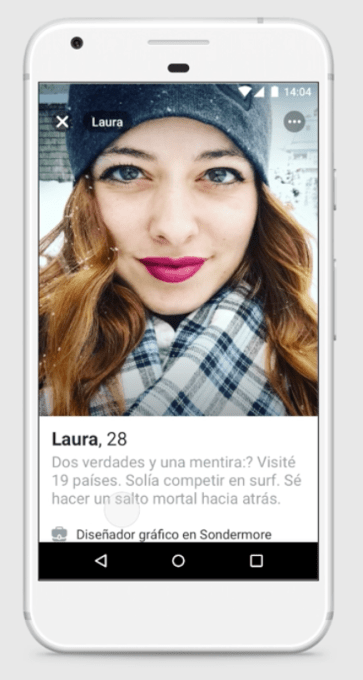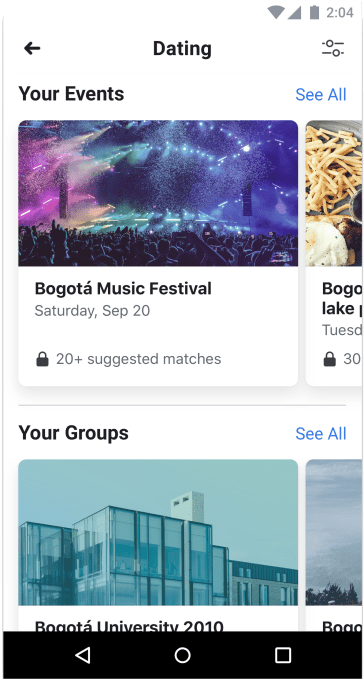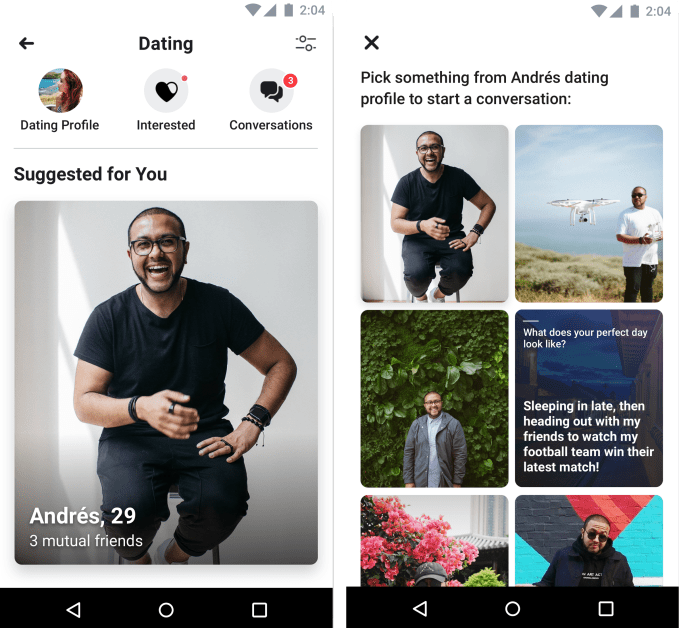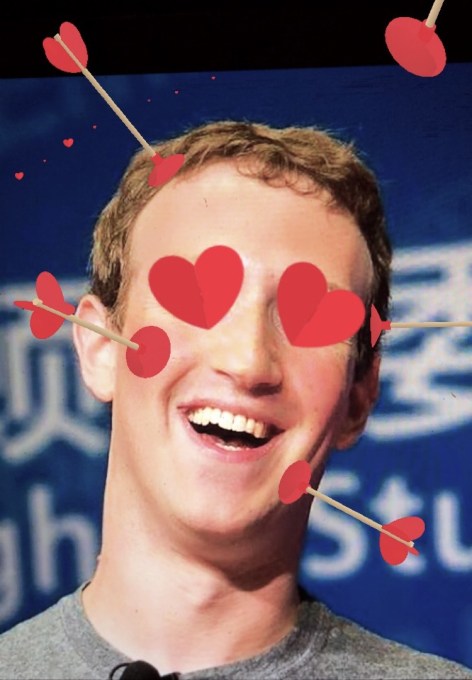Inside Facebook Dating, launching today first in Colombia
Does deeper data produce perfect matches? Facebook is finally ready to find out, starting today with a country-wide test in Colombia of its new Dating feature. It’s centered around an algorithm-powered homescreen of Suggested romantic matches based on everything Facebook knows about you that other apps don’t. There’s no swiping and it’s not trying to look cool, but Facebook Dating is familiar and non-threatening enough to feel accessible to Facebook’s broad array of single users.
Originally announced at F8 in May, Facebook has hammered out details like limiting users to expressing interest in a maximum of 100 people per day, spotlighting personal questions as well as photos, and defaulting to show you friends-of-friends as well as strangers unless you only want to see people with no mutual connections. If the test goes well, expect Facebook to roll Dating out to more countries shortly as the social network pushes its mission to create meaningful connections and the perception that it can be a force of good.
 “The goal of the team is to make Facebook simply the best place to start a relationship online” Facebook Dating’s product manager Nathan Sharp told me during an expansive interview about the company’s strategy and how it chose to diverge from the top dating apps. For starters, it’s not trying to compete with Tinder for where you find hookups by swiping through infinite options, but instead beat eHarmony, Hinge, and OKCupid at finding you a life partner. And it’s all about privacy, from its opt-in nature to how it’s almost entirely siloed from Facebook though lives within the same app.
“The goal of the team is to make Facebook simply the best place to start a relationship online” Facebook Dating’s product manager Nathan Sharp told me during an expansive interview about the company’s strategy and how it chose to diverge from the top dating apps. For starters, it’s not trying to compete with Tinder for where you find hookups by swiping through infinite options, but instead beat eHarmony, Hinge, and OKCupid at finding you a life partner. And it’s all about privacy, from its opt-in nature to how it’s almost entirely siloed from Facebook though lives within the same app.
“We wanted to make a product that encouraged people to remember that there are people behind the profiles and the cards that they’re seeing. We wanted a system that emphasizes consideration over impulse. We want you to consider more than that person’s profile photo.”
Though Facebook could surely earn a ton off of Facebook Dating if it gets popular, for now there are no plans to monetize it with ads or premium subscriptions to bonus features. But as Facebook strives to stay relevant beyond the aging News Feed and combat its branding crisis, there are plenty of incentives for it to find us a significant other.
How Facebook Dating Works…
“Dating is something we’ve seen on the platform since the earliest days. We know there are 200 million people who list themselves as single” says Sharp. He’s married himself but says with a laugh that Facebook Dating “is definitely a young and single team.” Back in 2004, online dating still had a sleazy reputation. But now that over a third of U.S. marriages start online, and Facebook has had time to identify the pitfalls stumbled into by other dating apps, it’s ready to pucker up.
 The basic flow is that users 18 and up (or the local ‘Adult’ equivalent) will see a notice atop their News Feed inviting them to try Facebook Dating when it comes to their country, and they’ll see a shortcut in their bookmarks menu. For now Facebook Dating is mobile-only, and will is bundled into the social network’s main iOS and Android apps.
The basic flow is that users 18 and up (or the local ‘Adult’ equivalent) will see a notice atop their News Feed inviting them to try Facebook Dating when it comes to their country, and they’ll see a shortcut in their bookmarks menu. For now Facebook Dating is mobile-only, and will is bundled into the social network’s main iOS and Android apps.
They’ll opt in, verify their city using their phone’s location services, and decide whether to add details like a free-form bio, workplace, education, religion, height, and if they have children. Facebook offers non-binary genders and sexual orientations. To fill out their profile, they’ll choose up to a dozen photos they upload, are tagged in, previously posted to Facebook, or cross-posted from Instagram as well as answer up to 20 questions about their personality such as “What does your perfect day look like?” or “What song always makes you sing along? How loud?”
Users can select to filter their matches by distance (up to a maximum radius of 100 kilometers), if they have children, religion, height, and age. They may then browse through the homescreen’s Suggested matches list, or they can choose to ‘Unlock’ Events and Groups they’re part of to see people from those who’ve done the same. Anyone you’ve blocked on Facebook won’t show up, though unfriended exs might. To see the next person, they either have to say they’re not interested, or choose a photo or question from the person’s profile and send them a message related to it (or at least they’re supposed to), and afterwards the sender can’t see the recipient any more.
The text and emoji-only messages go through a special Facebook Dating chat section, not Messenger, and land in the recipient’s Interested tab with no read receipts. If they reply, the chat moves to both people’s Conversations tab. From there they can decide to connect elsewhere online or meet up in person.
Sharp admits that “The moment you try to control the system you may have some unexpected behaviors occur there”. Facebook thought ahead so you can’t message photos (dick pics), you’re supposed to tie your message to a piece of their content (fewer generic pick-up lines), and you can’t follow up with people who don’t respond to you (stalking). But the company plans to stay vigilant in case unexpected forms of abuse or privacy issues emerge. Overall, Facebook managed to pull off Dating without any glaring privacy snafus or other obvious missteps.
…And Why
Starting today, users in Colombia will be able to create a Facebook Dating profile, but the company won’t start serving matches until there are enough sign ups. Sharp tells me “we don’t expect it to take months.” But why Colombia? He says it’s because much of South America has culturally accepted online dating, it has a sizeable population of 30 million monthly active Facebook users, and the social network can track data out of a few discrete metropolitan areas.
It also likely limits the prying eyes of journalists hunting for Facebook policy or privacy screw-ups, and eliminates the risk of disrupting its advertising in more lucrative markets like the U.S. It’s hard to forget that Facebook screwed up news consumption in Sri Lanka, Bolivia, Slovakia, Serbia, Guatemala and Cambodia last year by banishing all news publishers to a separate feed — effectively depriving the populations of important information. There are consequences to its experiments.

There are a lot of other ‘whys’ to how Facebook Dating was built. Sharp ran me through the decision making process his team undertook to turn Facebook Dating from a concept into a concrete product. Here I’ll run through its rules and features while explaining the philosophy behind them:
- Meaningful relationships not one-night-stands, because “meaningful” is Facebook’s new watchword as it enters the ‘Time Well Spent’ era, and the company has the deep biographical and interest data to find you matches you’ll want to wake up next to each day, not just go to bed with.
- Opt-in not automatic enrollment, because “not everyone who’s single wants to date, not everyone who wants to date wants to date online, and not everyone who dates online wants to date on Facebook” says Sharp in a moment of humility.
- Within Facebook not a new app, because it lowers the barrier to behavior that’s already hard enough for some people, and it can only achieve its mission if people actually use it.
- Friends-of-friends and strangers not friends, because many people’s biggest fear is “are my friends and family going to see this?” says Sharp. People who are already friends don’t need help meeting and may already know if they want to date each other.
- A new profile not your same one, because some people might want to share a different side of themselves or might not publicly disclose their true sexual orientation. The only info ported into Facebook Dating is your first name and age.
- Message and response not both people swiped right, because since Facebook wants you to be deliberate about who you show interest in, you have to send one message and hope to hear back. There’s no infinite right-swiping and then waiting to get matched or messaged. “It puts the power in the responder” Sharp says.
- Profiles and chat are separate not part of Facebook, because it doesn’t want to scare users about privacy slip-ups, and doesn’t want people to pollute the main Facebook experience soliciting dates
- Real age and location not self-described, because Facebook wants to prevent catfishing as well as users contacting matches in distant cities who they’ll never meet.
- Matches through Events and Groups not randos, because a photo isn’t enough for choosing a life partner, interest overlaps are key to compatability, and they give people ready-made happenings to use as dates.

A prototype of Facebook Dating’s onboarding flow
The end result is an online dating product that maximizes convenience, both in where it’s available and how much hunting you have to do by yourself. It’s distinctly one-size-fits-all to the point that it risks being seen as universally embarassing. Luckily only other Dating users can tell if you’re on it and there’s no way to search for someone specific, but there’s still the threat of humilating screenshots surfacing. It will be fascinating to see how Facebook Dating’s marketing strategy and style develops.
 Facebook’s real advantage in this market will be its near-bottomless trove of personal data about all of us. It could analyze trends in characteristics of people who list themselves in a relationship together or what kinds of people respond to what kinds of people’s friend requests or messages. For matching, it could pair people who check in to similar locations or whose GPS paths cross, singles who Like similar bands or restaurants, or those who watch the same kinds of viral videos or share links from the same news outlet. Apps like Tinder can only scratch the surface with partnerships like its one with Foursquare to power its new Places matches. Turning all this info into insights about who’d like who will be a massive challenge for Facebook’s data scientists.
Facebook’s real advantage in this market will be its near-bottomless trove of personal data about all of us. It could analyze trends in characteristics of people who list themselves in a relationship together or what kinds of people respond to what kinds of people’s friend requests or messages. For matching, it could pair people who check in to similar locations or whose GPS paths cross, singles who Like similar bands or restaurants, or those who watch the same kinds of viral videos or share links from the same news outlet. Apps like Tinder can only scratch the surface with partnerships like its one with Foursquare to power its new Places matches. Turning all this info into insights about who’d like who will be a massive challenge for Facebook’s data scientists.
The big question remains how far Facebook will go to making Dating a hit. The feature could live or die by whether Facebook is willing to constantly nag its single users to sign-up. Without the gamification of swiping for fun, Facebook Dating will have to rely on its utility. The company is in a precarious time for its brand, and may have trouble getting people to trust it with an even more sensitive part of their lives.
“As all the events of the past year have unfolded, it’s only underscored the importance of privacy” Sharp concludes. No one wants their dating profile ending up Cambridge Analytica’d. But if analyzing your every Like and link gives Facebook uncanny matching accuracy, word could travel fast if it’s how people find their soul-mates.
✍ Source : ☕ Social – TechCrunch
To continue reading click link or copy to web server. :
(✿◠‿◠)✌ Mukah Pages : 👍 Making Social Media Marketing Make Easy Through Internet Auto-Post System. Enjoy reading and don't forget to 👍 Like & 💕 Share!



















Post a Comment